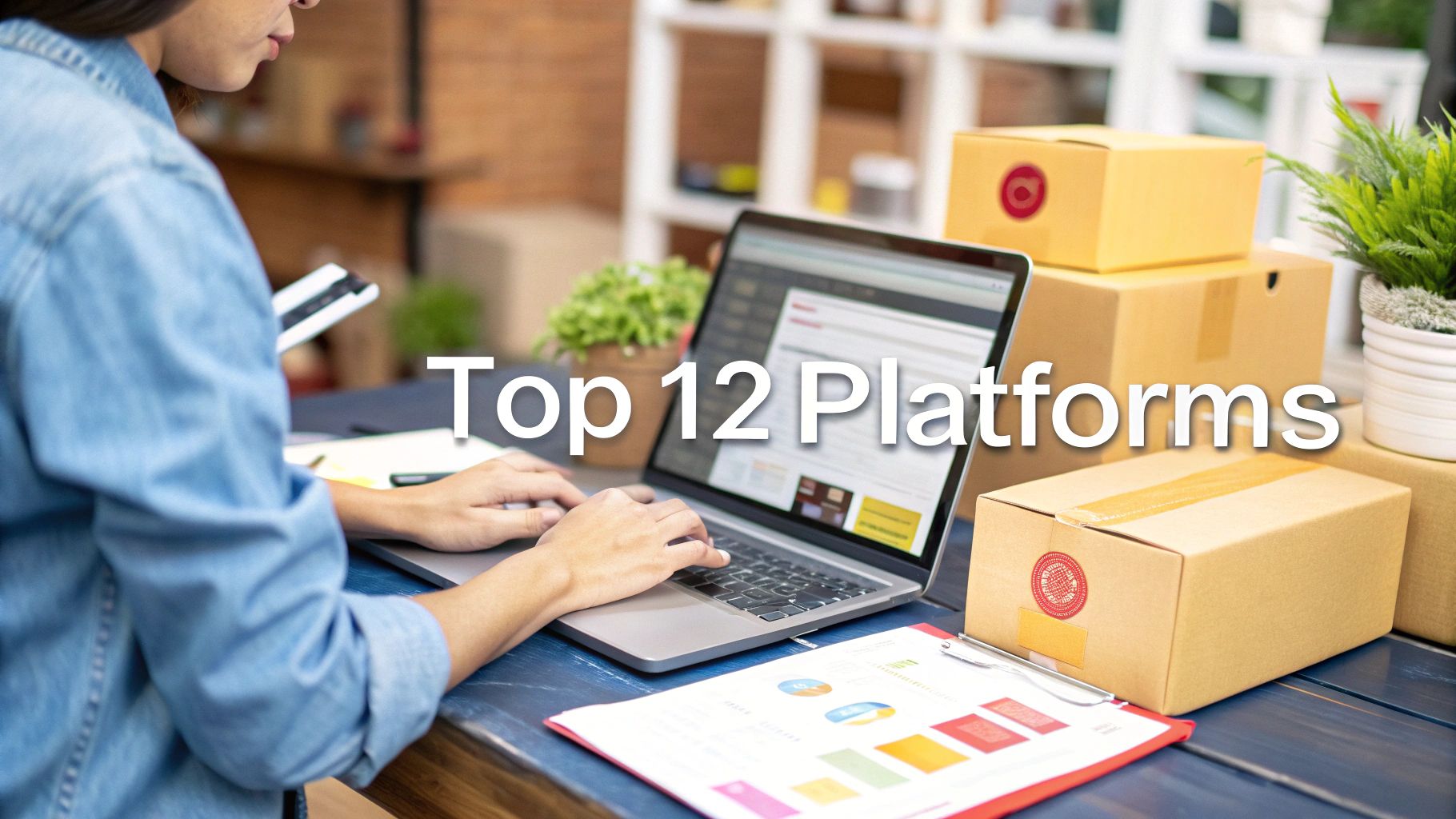Starting an online store is one of the most powerful moves a small business can make. But with so many options, finding the right foundation for your digital shop can feel overwhelming. The ideal platform isn't just about listing products; it's about managing inventory, processing payments securely, reaching customers, and having the flexibility to grow. Making the wrong choice can lead to lost sales, operational headaches, and costly migrations down the road.
This guide cuts through the noise to analyze the best ecommerce platforms for small business, focusing on what truly matters: ease of use, scalability, transparent pricing, and real-world performance. We dive deep into each option with practical pros, honest limitations, and specific use cases to help you find the perfect fit. To compare perspectives and detailed reviews from other sources, you may find additional insights in an article on the Top 12 Best Ecommerce Platforms for Small Business in 2025.
Here, you'll find a clear, no-fluff comparison of the leading contenders, from all-in-one solutions like Shopify to flexible integrations like WooCommerce. Each overview includes screenshots and direct links, so you can make an informed decision and build a business that thrives online. Let's find the platform that will power your growth.
1. Shopify
Shopify stands out as one of the best ecommerce platforms for small business due to its comprehensive, all-in-one nature and remarkable scalability. It's an ideal choice for entrepreneurs who want a powerful platform that can grow with their business, eliminating the need to migrate systems later on. Shopify provides a robust foundation, from a user-friendly drag-and-drop store builder to integrated payment processing and native point-of-sale (POS) systems for businesses with physical locations.

The platform's true strength lies in its extensive app ecosystem, allowing you to add nearly any functionality imaginable, from advanced marketing automation to specialized inventory management. This flexibility makes it suitable for a wide range of business models. Once you've chosen Shopify, optimizing your store becomes crucial. For instance, understanding and implementing effective cart abandonment strategies for Shopify can significantly boost your revenue.
Key Details & Pricing
- Best For: Businesses of all sizes, from startups to large enterprises, that need a scalable, all-in-one solution.
- Pricing: Plans start at $29/month (billed annually) for the Basic plan, which is great for new businesses.
- Transaction Fees: 2.9% + 30¢ for online sales on the Basic plan with Shopify Payments. Note that using external payment gateways incurs an additional fee.
- Pros: Highly scalable, vast app marketplace for customization, excellent checkout conversion.
- Cons: Monthly costs can increase with necessary apps, transaction fees for non-Shopify payment providers.
For those needing help to get started, you can get professional help with e-commerce web development using Shopify.
Website: https://www.shopify.com
2. Wix eCommerce
Wix eCommerce has carved out a niche as one of the best ecommerce platforms for small business, particularly for those prioritizing ease of use and design flexibility. It empowers entrepreneurs with a highly intuitive drag-and-drop editor and hundreds of modern templates, making it possible to launch a professional-looking online store quickly without any coding knowledge. The platform bundles everything a new business needs, including reliable hosting, an SSL certificate, and built-in marketing tools.
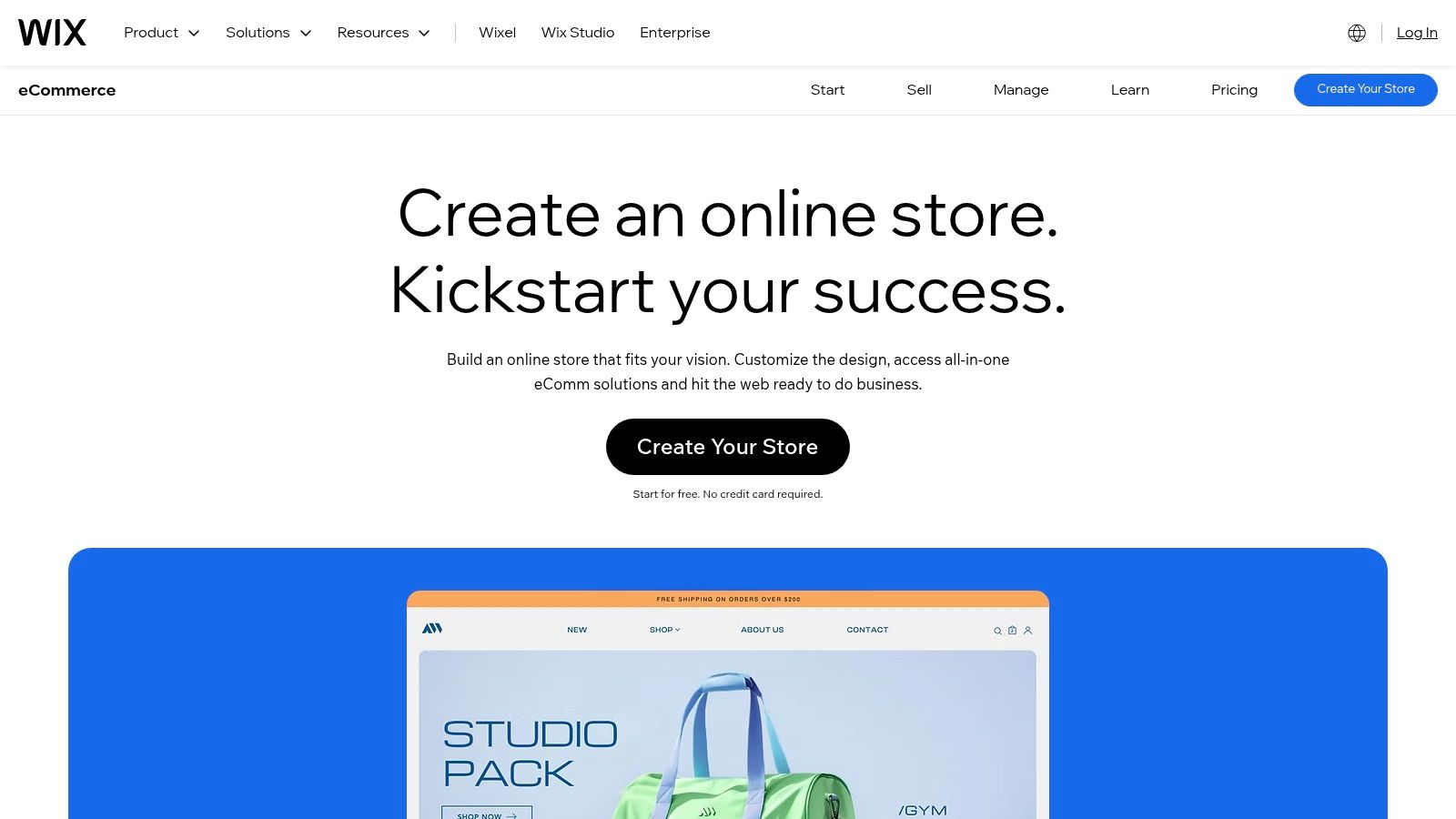
This all-in-one approach is a significant advantage for users who want to manage their website, marketing, and sales from a single dashboard. Wix also offers powerful features like multichannel selling, abandoned cart recovery, and an AI-assisted site creation tool to streamline the setup process. This combination of user-friendliness and robust, integrated features provides exceptional value for startups and small businesses focused on a swift and stylish market entry.
Key Details & Pricing
- Best For: Beginners, artists, and small businesses that need a visually stunning store with an easy-to-use, all-in-one platform.
- Pricing: Business and eCommerce plans start at $27/month (billed annually) for the Core plan.
- Transaction Fees: 2.9% + 30¢ for online sales using Wix Payments. No additional transaction fees are charged by Wix.
- Pros: Very easy to design with a drag-and-drop editor, all-in-one hosting and security, good native marketing and SEO toolkit.
- Cons: Migrating to other platforms can be more difficult later on, and costs can increase with necessary apps from the App Market.
Website: https://www.wix.com/ecommerce/online-store
3. Squarespace Commerce
Squarespace Commerce carves out its niche among the best ecommerce platforms for small business by championing design-forward simplicity. It's an excellent choice for brand-heavy businesses, artists, and creators who prioritize aesthetics and want a seamless integration of content and commerce. The platform is renowned for its award-winning, visually stunning templates that make creating a professional-looking online store accessible to everyone, regardless of technical skill.
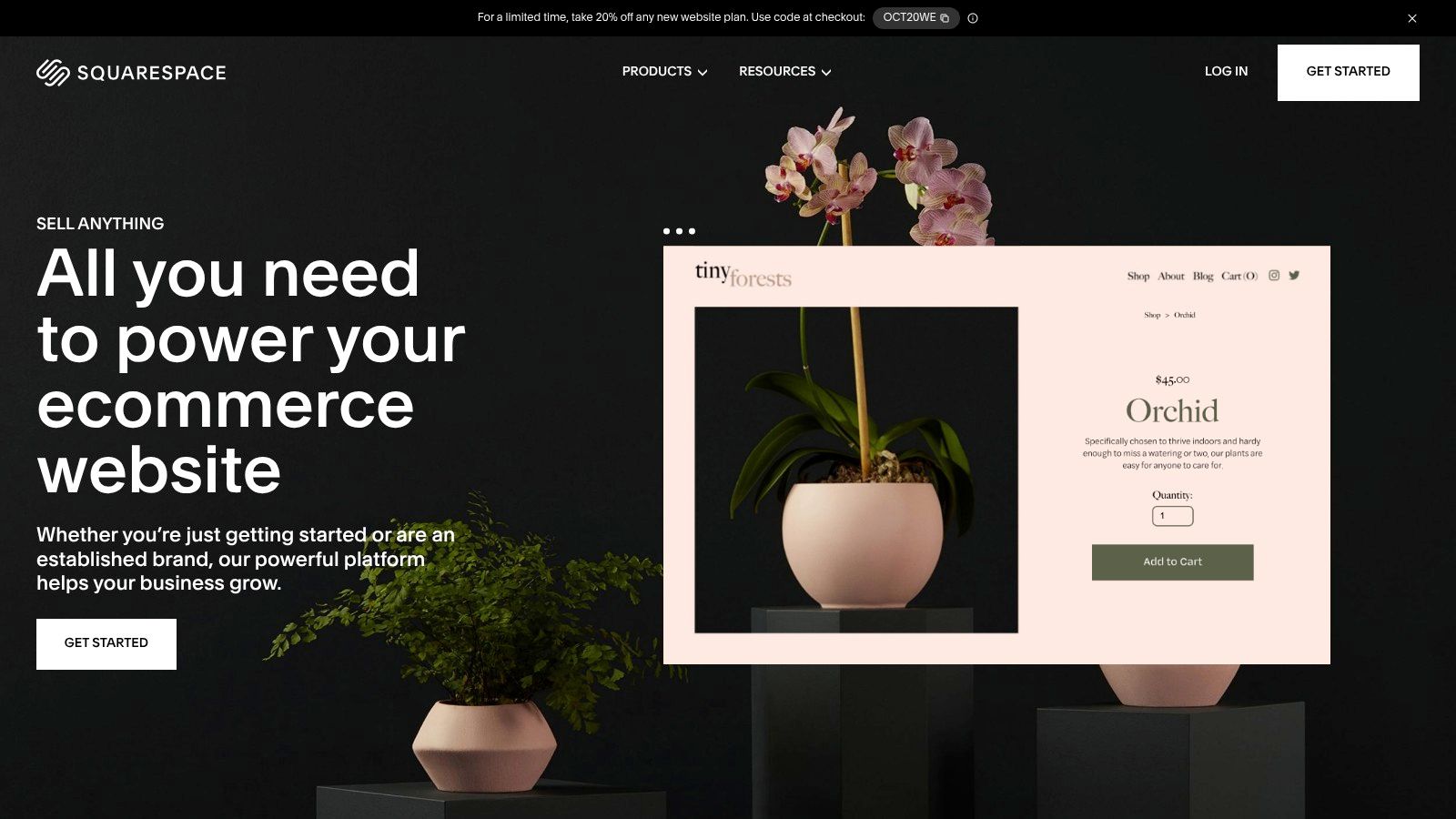
The platform supports a variety of business models with features like recurring memberships, subscription products, and digital goods sales. Squarespace also provides built-in tools for email campaigns, social media integration, and analytics, offering a cohesive toolkit for marketing your brand. While it may not have the sheer volume of apps that competitors do, its curated, high-quality integrations handle most essential business needs effectively. This makes it ideal for those who value an all-in-one, elegant solution over extensive customization.
Key Details & Pricing
- Best For: Creatives, service-based businesses, and brands where stunning visual presentation is a top priority.
- Pricing: Commerce plans start at $27/month (billed annually) for the Business plan.
- Transaction Fees: 0% on the Commerce Basic and Commerce Advanced plans. A 3% transaction fee applies to the Business plan. Standard payment processor fees still apply.
- Pros: Excellent design and templates, straightforward store setup, solid content and commerce combination.
- Cons: Some advanced ecommerce features require higher tiers, limited payment gateway options compared to others.
Website: https://www.squarespace.com/commerce
4. BigCommerce
BigCommerce establishes itself as one of the best ecommerce platforms for small business by offering a powerful, feature-rich solution with zero platform transaction fees. It is uniquely positioned for businesses with ambitious growth plans and larger product catalogs, providing robust built-in functionalities like advanced product filtering, native discounts, and coupons right out of the box. This eliminates the need for many of the paid apps that other platforms require, making it a cost-effective choice for scaling.
The platform’s strength is evident in its native multi-channel selling capabilities, allowing seamless integration with marketplaces like Amazon and eBay. BigCommerce also supports both B2C and B2B models with its powerful feature set and offers headless commerce options for businesses wanting maximum front-end flexibility. As you grow, it's essential to optimize conversions, and you can get an overview of strategies for how to reduce cart abandonment on BigCommerce to maximize your sales.
Key Details & Pricing
- Best For: Fast-growing small businesses and mid-market retailers that need extensive built-in features without relying on apps.
- Pricing: Plans start at $29/month (billed annually). Tiers are based on your annual online sales volume.
- Transaction Fees: 0% platform transaction fees on all plans. Standard credit card processing rates still apply.
- Pros: Feature-rich out of the box, strong SEO capabilities, no platform transaction fees, transparent sales thresholds for plan upgrades.
- Cons: Automatic plan upgrades based on sales can be an unexpected expense, the platform can have a steeper learning curve for beginners.
Website: https://www.bigcommerce.com
5. WooCommerce (WordPress)
For small businesses already comfortable with WordPress, WooCommerce is often the best ecommerce platform choice due to its seamless integration and open-source flexibility. It's not a standalone platform but a powerful, free plugin that transforms your WordPress site into a fully functional online store. This approach grants you complete control over your data, hosting, and overall technical environment, making it ideal for those who value customization and ownership over an all-in-one, hosted solution.
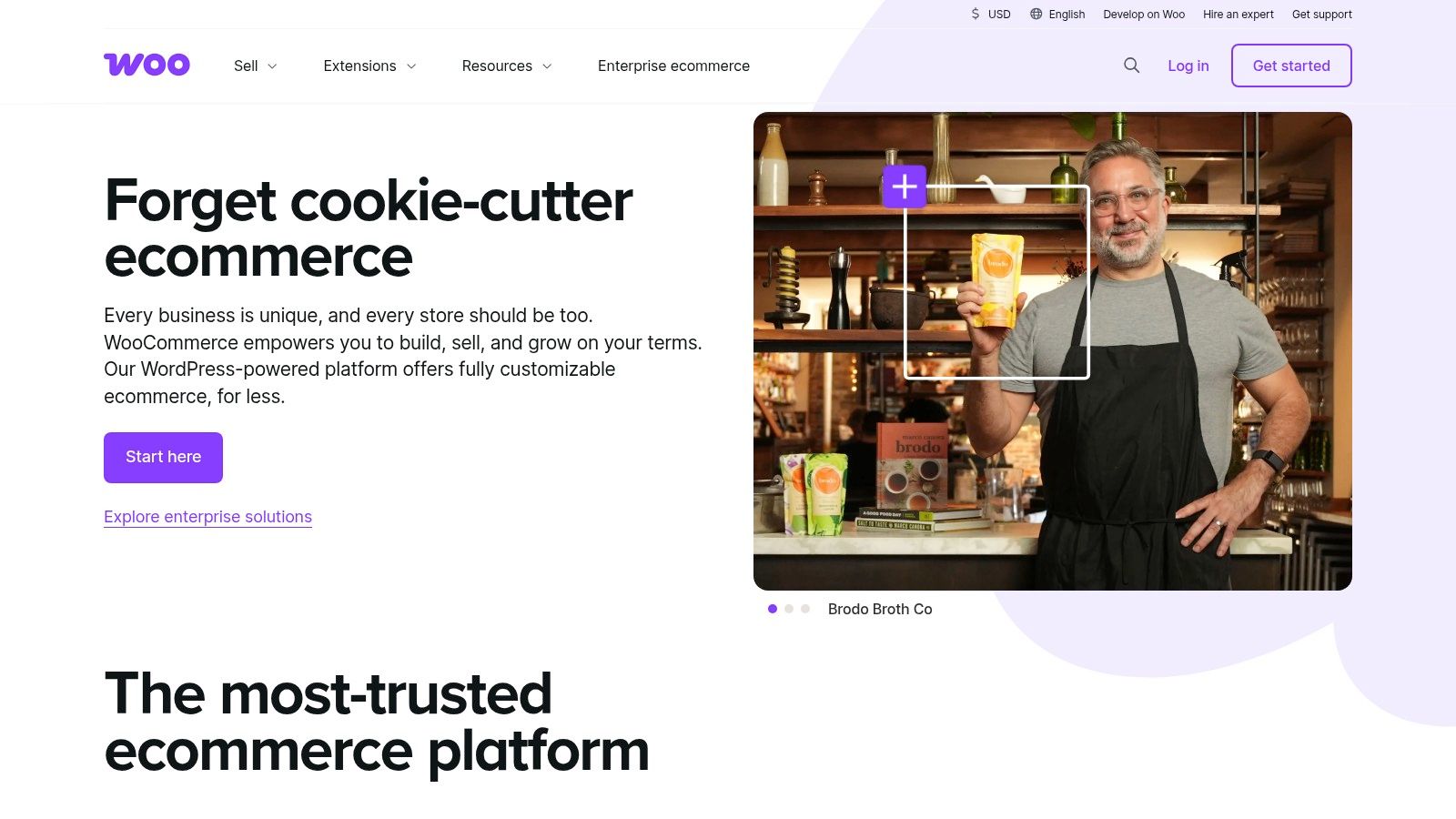
The platform's strength is its unparalleled customizability through a massive ecosystem of themes and extensions. You can add virtually any feature, from subscriptions and bookings to complex product variations. However, this freedom comes with responsibility; you are in charge of managing your own hosting, security, and updates. Performance optimization is also key, as a poorly configured WordPress site can lead to slow load times and lost sales.
Key Details & Pricing
- Best For: Businesses with an existing WordPress site or those who want total control over their store's hosting, design, and functionality.
- Pricing: The core WooCommerce plugin is free. Costs arise from web hosting, domain name, themes, and paid extensions.
- Transaction Fees: 2.9% + 30¢ per transaction for U.S. cards with WooPayments. No additional fees for using third-party gateways.
- Pros: Unlimited customization, large developer community, you own your store and data completely.
- Cons: Requires you to manage hosting, security, and updates; costs for extensions and themes can add up.
Website: https://woocommerce.com
6. Square Online (by Square/Block)
Square Online is one of the best ecommerce platforms for small business owners already using or planning to use the Square ecosystem. Its primary strength is the seamless integration with Square's Point of Sale (POS) system, making it an exceptional choice for businesses with both a physical and digital presence, such as restaurants, retail stores, and service providers. The platform excels at facilitating local commerce with built-in tools for curbside pickup, local delivery, and multi-location inventory synchronization.
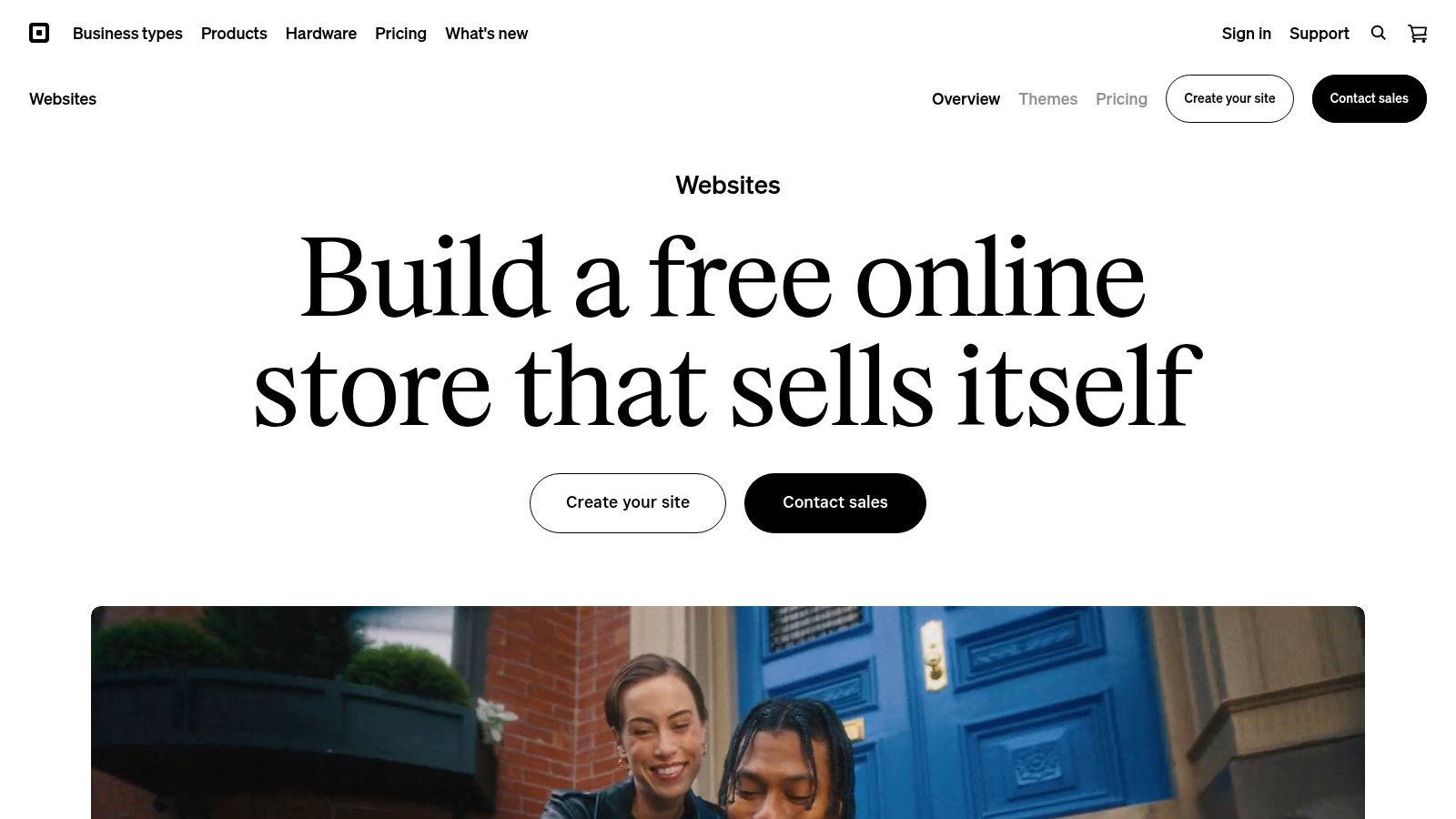
The platform is designed for rapid deployment, allowing businesses to launch a functional online store quickly. While its customization options are more streamlined than some competitors, this simplicity is a benefit for those who prioritize ease of use. To maximize visibility from the start, it's wise to implement foundational strategies from the ground up; for more guidance, you can review some ecommerce SEO best practices. This ensures your new site is built for search engine success.
Key Details & Pricing
- Best For: Retailers, restaurants, and service-based businesses using Square POS who need a simple, integrated online store.
- Pricing: A free plan is available, with paid plans starting at $29/month (billed annually) to unlock advanced features.
- Transaction Fees: Starts at 2.9% + 30¢ for online sales. All payments are processed through Square.
- Pros: Seamless integration with Square POS, very simple and fast setup, predictable processing rates across all channels.
- Cons: Some crucial features are locked behind higher-tier plans, and design customization is less flexible than other platforms.
Website: https://squareup.com/online-store
7. Ecwid by Lightspeed
Ecwid by Lightspeed offers a unique and flexible approach, making it one of the best ecommerce platforms for small business owners who already have a website. Instead of requiring a full site rebuild, Ecwid acts as a powerful widget or plug-in that seamlessly integrates into your existing WordPress, Wix, or custom-built site. This "add-on" model allows you to start selling quickly without disrupting your current online presence.
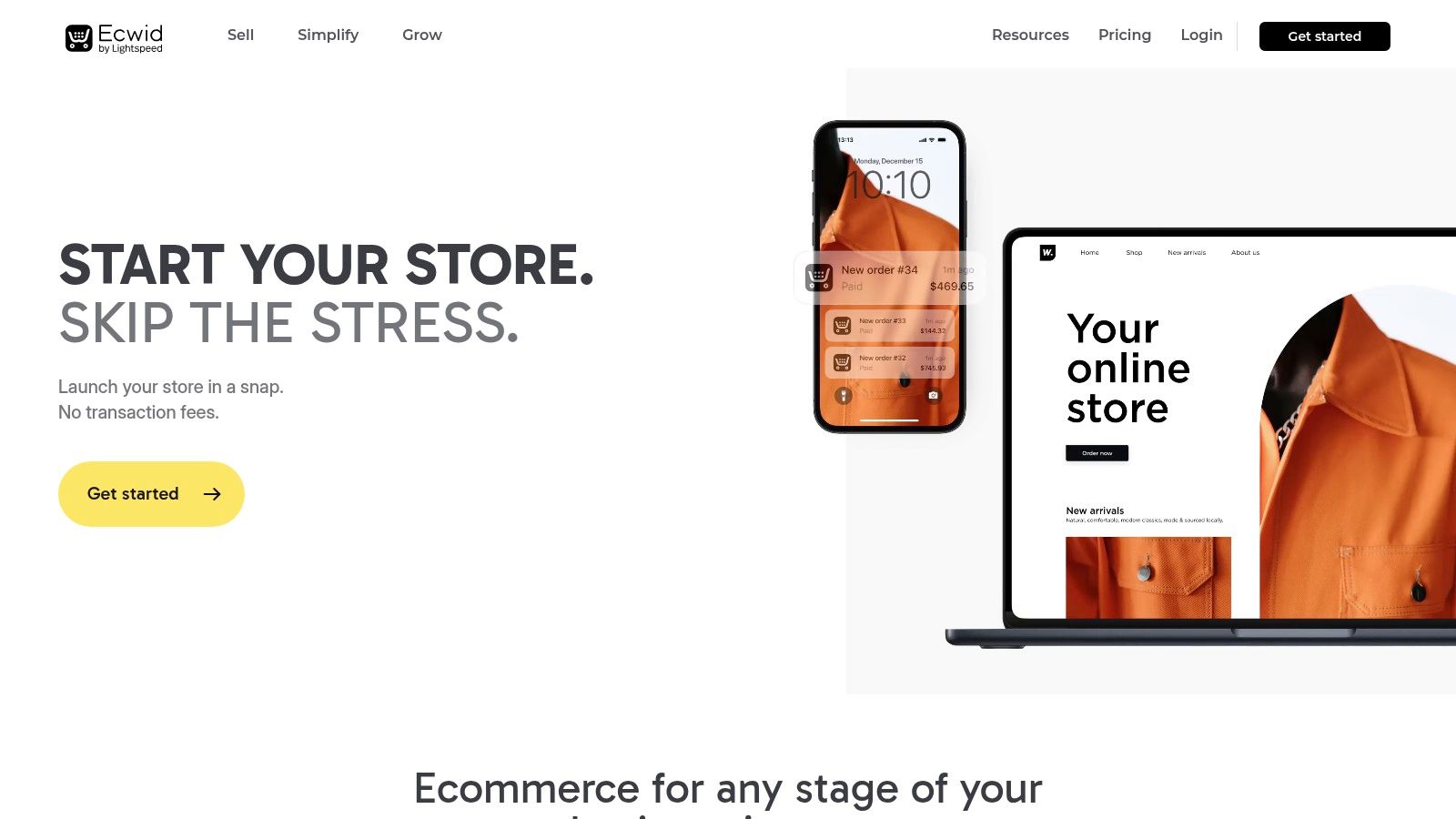
The platform truly shines in its multichannel selling capabilities. You can manage your product catalog from one central dashboard and sell simultaneously across your website, social media channels like Facebook and Instagram, and even marketplaces. This makes it an excellent choice for businesses aiming to reach customers wherever they are without adding administrative complexity.
Key Details & Pricing
- Best For: Small businesses that want to add ecommerce functionality to an existing website or sell across multiple social media platforms.
- Pricing: A free plan is available for up to 5 products. Paid plans with more features start at $14.08/month (billed annually).
- Transaction Fees: 0% transaction fees on all plans, but standard payment processor fees from Stripe, PayPal, etc., will apply.
- Pros: Instantly adds to existing sites, strong multichannel and social selling tools, generous free-forever plan.
- Cons: Advanced features are locked behind higher-tier plans, and design customization is limited by the host website's capabilities.
Website: https://www.ecwid.com
8. Shift4Shop (formerly 3dcart)
Shift4Shop earns its place as one of the best ecommerce platforms for small business through a compelling, feature-rich free plan. This is an excellent option for U.S.-based entrepreneurs who are budget-conscious but don't want to compromise on functionality. By bundling its services with Shift4 payment processing, the platform offers a surprisingly robust, all-in-one ecommerce solution at no monthly cost, making it highly attractive for new ventures looking to minimize initial overhead.
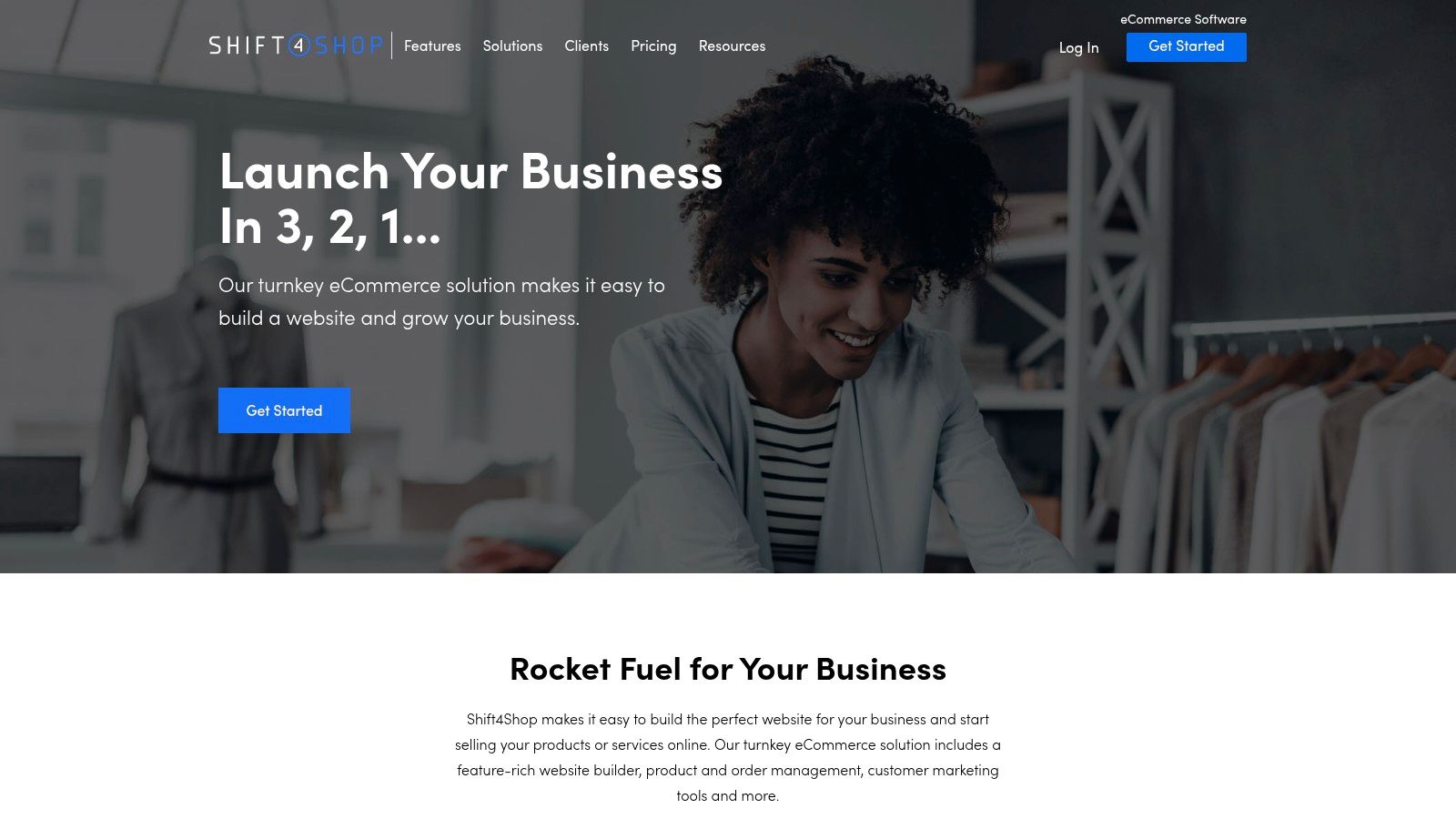
Unlike some free platforms that limit features, Shift4Shop's End-to-End plan includes unlimited products, a free domain, an SSL certificate, and built-in fraud protection. This comprehensive offering allows small businesses to launch a professional and secure online store without the typical tiered feature restrictions. The platform also provides powerful shipping integrations and a variety of free themes, ensuring businesses can get started quickly and efficiently.
Key Details & Pricing
- Best For: U.S.-based small businesses seeking a feature-packed, cost-effective solution without a monthly subscription fee.
- Pricing: The End-to-End Ecommerce plan is free ($0/month) for U.S. merchants who use Shift4 as their payment processor.
- Transaction Fees: Standard Shift4 payment processing rates apply, which are competitive within the industry.
- Pros: Extremely cost-effective for U.S. merchants, comes with many built-in features, PCI-compliant hosting included.
- Cons: The free plan is only available to U.S. businesses using Shift4 payments; paid plan prices are subject to change.
Website: https://www.shift4shop.com
9. GoDaddy Online Store
GoDaddy Online Store is an excellent entry point for entrepreneurs already in the GoDaddy ecosystem or those seeking an extremely simple, all-in-one solution. It bundles a website builder, domain management, basic marketing tools, and ecommerce functionality into one cohesive package. This platform is designed for very small businesses and sole proprietors who prioritize a low-friction setup over advanced customization, making it one of the most straightforward ecommerce platforms for small business beginners.
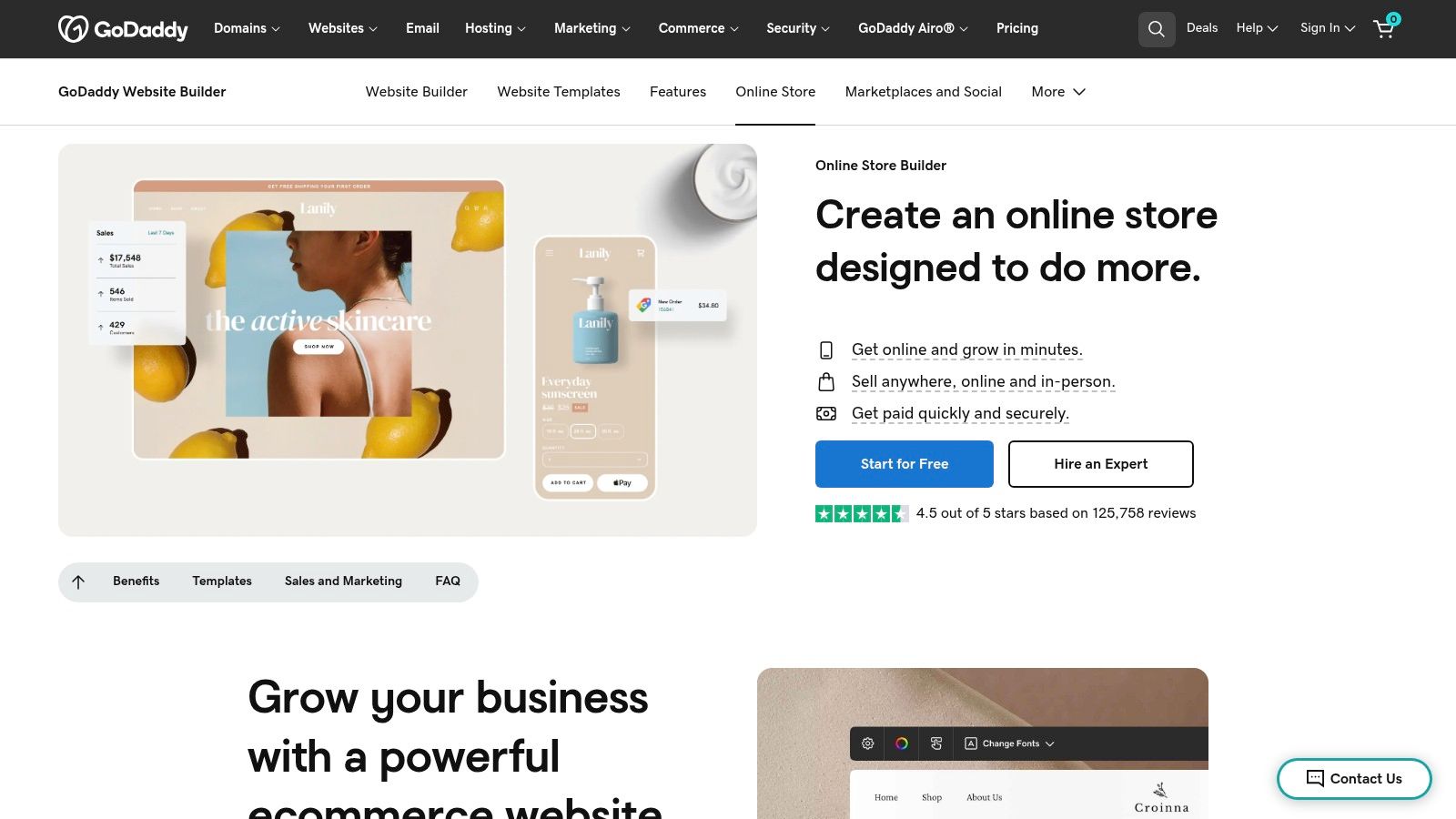
The platform’s key advantage is its integrated nature. You can manage your online store, sync product listings to marketplaces like Amazon and Etsy, and use built-in SEO and email marketing tools from a single dashboard. GoDaddy Payments also offers competitive processing rates, further simplifying financial management. While it lacks the deep functionality of more specialized platforms, its strength lies in providing all the essential tools without overwhelming new users.
Key Details & Pricing
- Best For: Solopreneurs and very small businesses needing a simple, bundled solution for domains, hosting, and basic ecommerce.
- Pricing: The Commerce plan, which includes all ecommerce features, starts at $20.99/month (billed annually).
- Transaction Fees: Starts at 2.3% + 30¢ per online transaction with GoDaddy Payments.
- Pros: Very easy setup and management, all-in-one solution with domains and marketing, competitive payment processing rates.
- Cons: Limited design flexibility and scalability, lacks the advanced features of dedicated ecommerce platforms.
Website: https://www.godaddy.com/websites/online-store
10. Big Cartel
Big Cartel is a fantastic niche player among the best ecommerce platforms for small business, specifically designed for artists, makers, and creators. It shines with its simplicity and artist-first approach, offering a straightforward way for creative entrepreneurs to sell their work online without the complexity of larger, more feature-heavy systems. The platform focuses on getting you selling quickly with a minimal learning curve, making it perfect for those with small product catalogs or who are launching their first online store.

The platform champions the independent artist, providing just the essential tools needed to run a small shop. This includes basic theme customization, discount codes, and simple order management. While it lacks the advanced marketing and inventory tools of its competitors, its affordability and ease of use make it an accessible entry point into ecommerce for creatives who prioritize simplicity and brand personality over extensive functionality.
Key Details & Pricing
- Best For: Artists, crafters, musicians, and makers with a limited number of products.
- Pricing: Offers a free plan for up to 5 products. Paid plans start at just $9.99/month for 50 products.
- Transaction Fees: No transaction fees from Big Cartel, but standard processing fees from Stripe or PayPal still apply.
- Pros: Extremely affordable with a free starting tier, incredibly easy to set up and use, strong focus on the creative community.
- Cons: Limited scalability, very basic features and customization, fewer integrations with third-party apps.
Website: https://www.bigcartel.com
11. Hostinger Website Builder (with eCommerce)
Hostinger Website Builder earns its spot as one of the best ecommerce platforms for small business by offering an incredibly budget-friendly, all-in-one solution. It's designed for entrepreneurs who are highly cost-sensitive and need to get a functional online store running quickly without a steep learning curve. The platform bundles hosting, a free domain for the first year, and SSL certificates, significantly lowering the initial investment for new ventures.
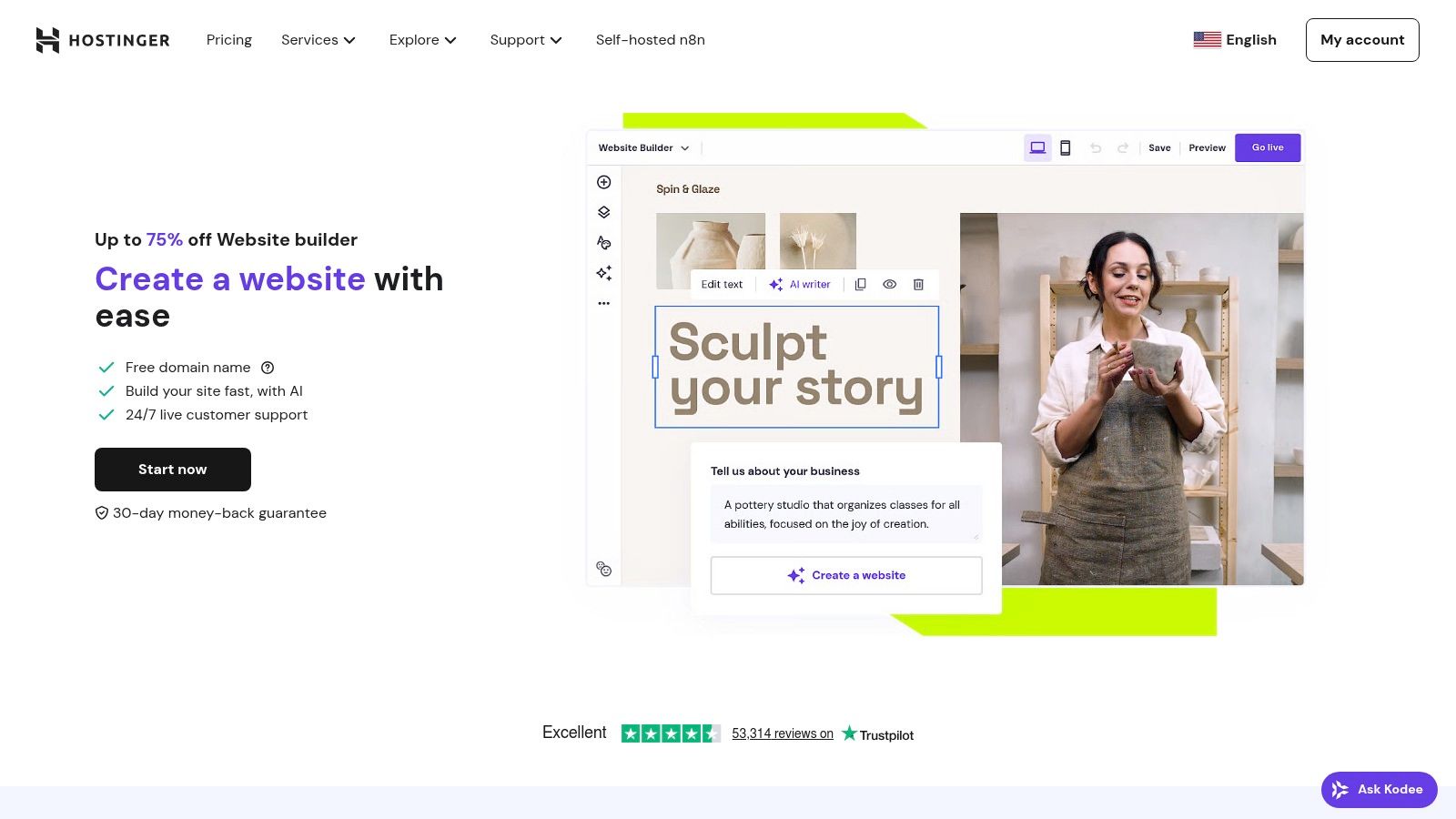
Its standout features are the integrated AI tools, which can help generate a website, text, and even images, streamlining the setup process for those with limited design or content creation resources. While it may not have the extensive app marketplace of larger platforms, it provides all the essential ecommerce functions needed to start selling, making it a powerful and accessible entry point into online retail.
Key Details & Pricing
- Best For: New businesses and solopreneurs seeking the lowest possible startup cost with an easy-to-use, all-inclusive platform.
- Pricing: A single, highly affordable plan is available, often around $2.99/month with introductory offers.
- Transaction Fees: 0% Hostinger transaction fees, though standard third-party payment gateway fees (e.g., Stripe, PayPal) still apply.
- Pros: Very low entry cost, includes hosting and a free domain (for the first year), straightforward to use with helpful AI tools.
- Cons: Less ecosystem depth compared to Shopify or WooCommerce, advanced ecommerce features are more basic.
Website: https://www.hostinger.com/website-builder
12. G2 Ecommerce Platforms Category
While not a platform itself, G2’s E-Commerce Platforms category is an indispensable research tool for any small business owner. It acts as a meta-resource, aggregating user reviews, ratings, and detailed feature comparisons across dozens of solutions. Instead of visiting each platform’s site individually, you can use G2 to create a shortlist of the best ecommerce platforms for your small business based on real-world feedback from peers. This approach saves significant time and helps you identify top contenders you may have otherwise missed.
The site’s strength lies in its filtering and comparison grids. You can specifically view platforms highly rated by other small businesses, compare features side-by-side, and read in-depth pros and cons summarized from recent user reviews. This peer-driven insight provides a layer of validation that marketing materials alone cannot offer, helping you make a more informed and confident decision before committing to a free trial or paid plan.
Key Details & Pricing
- Best For: Small businesses in the initial research phase, looking to compare options based on verified user reviews and ratings.
- Pricing: Free to use for research and comparison.
- Transaction Fees: Not applicable.
- Pros: Access to current peer feedback, powerful side-by-side platform comparisons, helps shortlist potential options much faster.
- Cons: Reviews can sometimes be vendor-influenced or incentivized, always verify specific pricing and feature details on the vendor’s official website.
Website: https://www.g2.com/categories/e-commerce-platforms
Top 12 Ecommerce Platforms Feature Comparison
| Platform | Core Features & Unique Selling Points ✨ | User Experience & Quality ★★★★☆ | Value Proposition & Price 💰 | Target Audience 👥 | Highlights 🏆 |
|---|---|---|---|---|---|
| Shopify | Scalable, app ecosystem, native POS, multichannel sales | Reliable, strong checkout conversion | Monthly + add-ons fees; extra gateway fees | Small to growing businesses | Robust all-in-one, extensive apps ✨ |
| Wix eCommerce | Drag-drop, AI site creator, marketing/SEO built-in | Very easy design, all-in-one hosting & security | Good value for ease, add-ons can add costs | Small biz wanting quick launch | Beginner-friendly, marketing toolkit ★★★★ |
| Squarespace Commerce | Design-forward, subscriptions, digital products | Beautiful templates, simple setup | Transaction fees vary by plan | Brand-focused small businesses | Top design quality, integrated email marketing ✨ |
| BigCommerce | No platform fees, multi-storefront, B2B/B2C features | Feature-rich, steeper learning curve | Sales-based plans, auto-upgrades | Fast-growing stores with large catalogs | Strong scalability & sales features 🏆 |
| WooCommerce (WordPress) | Open-source, highly customizable, extensions marketplace | Full control, need to manage hosting/security | Free core; extension & hosting costs vary | WordPress users wanting flexibility | Unlimited customization, large ecosystem ✨ |
| Square Online | Free plan, Square POS integration, local delivery options | Simple setup, predictable processing rates | Free plan + paid tiers | Restaurants, retail, local service biz | Seamless Square POS sync, local pickup support ✨ |
| Ecwid by Lightspeed | Add-to-any-site widget, multichannel sell, app marketplace | Quick integration, design tied to host site | Free tier, paid for advanced features | Sites needing ecommerce add-on | Easy multichannel expansion ★★★★ |
| Shift4Shop | End-to-End free plan with Shift4 payments, many included apps | PCI-compliant, cost-effective with Shift4 | Free with Shift4 payments, paid plans increase | Budget-conscious U.S. merchants | Unique free plan, robust shipping integrations ✨ |
| GoDaddy Online Store | Templates, marketplace sync, integrated payments | Low friction, all-in-one domain & marketing tools | Competitive rates, limited scalability | Very small businesses | Bundled domain + marketing, simple setup ★★★ |
| Big Cartel | Simple setup, custom domains, basic themes | Minimal learning curve, quick launch | Very affordable | Artists, makers, small catalogs | Lightweight & inexpensive solution ✨ |
| Hostinger Builder | AI tools, 100+ payments, free domain/SSL with annual plans | Low cost, easy to use | Low monthly cost, gateway fees apply | Cost-sensitive small businesses | AI site & image creation, large payment support ★ |
| G2 Ecommerce Platforms | User reviews, comparison grids, filtering by small business | Peer feedback, updated rankings | Free platform to research | All ecommerce buyers | Trusted reviews & side-by-side comparisons 🏆 |
Making the Right Choice for Your Business's Future
Navigating the landscape of ecommerce platforms can feel overwhelming, but making an informed decision is a critical step in building a resilient and profitable online business. As we've explored, the "best" platform is not a one-size-fits-all solution; it's the one that aligns perfectly with your specific business model, technical comfort level, and long-term growth ambitions. The journey to finding the right fit requires a strategic assessment of your unique needs.
This article has dissected a range of powerful tools, from all-in-one solutions to highly customizable open-source options. We've seen how platforms like Shopify offer a robust, user-friendly ecosystem ideal for businesses prioritizing rapid launch and scalability. In contrast, WooCommerce provides unparalleled control and customization for those already comfortable within the WordPress environment, allowing for a truly bespoke online store.
Key Takeaways for Your Decision-Making Process
To distill this information into actionable insights, consider these core factors before you commit:
- Scalability vs. Simplicity: Do you need a platform that can grow with you from ten products to ten thousand, like BigCommerce, or is a streamlined, simple solution like Square Online sufficient for your current needs? Be honest about your five-year plan.
- Budget and Total Cost of Ownership: Look beyond the monthly subscription fee. Factor in transaction fees, the cost of essential apps or plugins, and potential theme expenses. A lower-cost platform might become more expensive as you add necessary functionality.
- Technical Skill and Time Commitment: Your comfort with technology is a major deciding factor. Platforms like Wix and Squarespace are built for ease of use, while WooCommerce demands a more hands-on approach. Evaluate how much time you can realistically dedicate to building and maintaining your site.
- Product Type and Business Model: Your offerings dictate your needs. A business selling digital downloads has different requirements than one managing complex physical inventory. Similarly, a subscription-based service will need different tools than an artist selling one-of-a-kind pieces, where a platform like Big Cartel might shine.
Your Actionable Next Steps
Armed with this knowledge, your path forward should be clear. Start by shortlisting the top two or three platforms that resonate most with your business goals. Take advantage of free trials to get a hands-on feel for the dashboard, product management tools, and design interface. Test the checkout process from a customer's perspective. This practical experience is invaluable and will quickly reveal which platform feels most intuitive for you.
Ultimately, choosing from the best ecommerce platforms for small business is a foundational decision that impacts everything from your operational efficiency to your customer experience. It’s an investment in your digital future. By carefully weighing your options and aligning the platform's strengths with your strategic objectives, you can build a powerful online store that not only functions flawlessly but also serves as a dynamic engine for growth.
Feeling overwhelmed by the technical details or unsure how to align your platform choice with a powerful marketing strategy? The team at Up North Media specializes in developing high-performance, conversion-optimized ecommerce websites and executing data-driven SEO campaigns. We can help you select, build, and grow your online store, ensuring it not only looks great but also ranks high and drives revenue. Visit us at Up North Media to learn how we can build your digital future.
